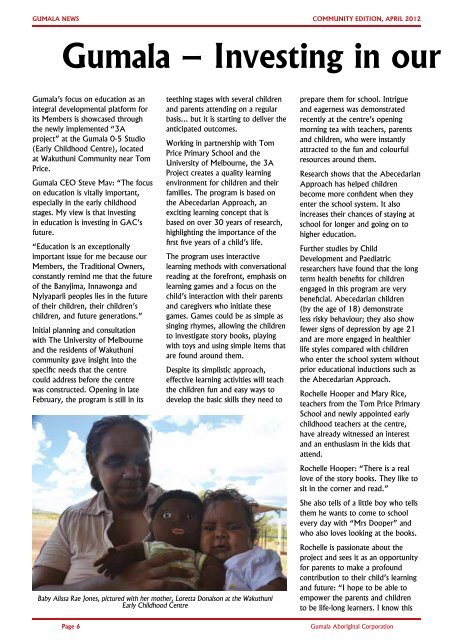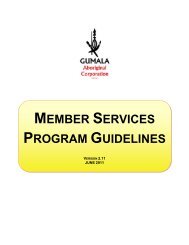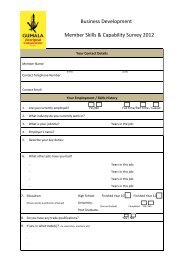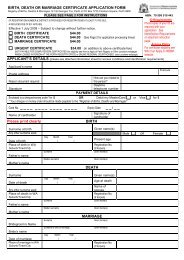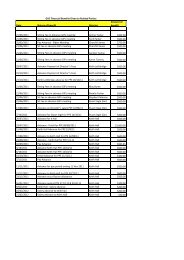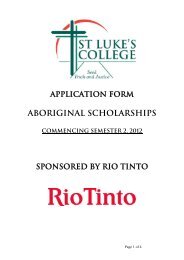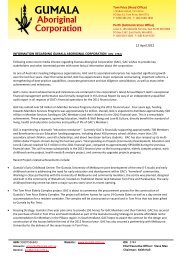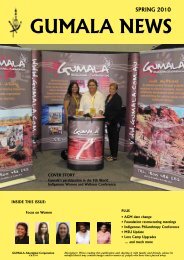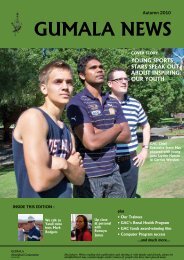Gumala News - April 2012 - Community Edition
Gumala News - April 2012 - Community Edition
Gumala News - April 2012 - Community Edition
You also want an ePaper? Increase the reach of your titles
YUMPU automatically turns print PDFs into web optimized ePapers that Google loves.
GUMALA NEWS COMMUNITY EDITION, APRIL <strong>2012</strong><br />
GUMALA NEWS COMMUNITY EDITION, APRIL <strong>2012</strong><br />
<strong>Gumala</strong> – Investing in our<br />
future through Education<br />
<strong>Gumala</strong>’s focus on education as an<br />
integral developmental platform for<br />
its Members is showcased through<br />
the newly implemented “3A<br />
project” at the <strong>Gumala</strong> 0-5 Studio<br />
(Early Childhood Centre), located<br />
at Wakuthuni <strong>Community</strong> near Tom<br />
Price.<br />
<strong>Gumala</strong> CEO Steve Mav: “The focus<br />
on education is vitally important,<br />
especially in the early childhood<br />
stages. My view is that investing<br />
in education is investing in GAC’s<br />
future.<br />
“Education is an exceptionally<br />
important issue for me because our<br />
Members, the Traditional Owners,<br />
constantly remind me that the future<br />
of the Banyjima, Innawonga and<br />
Nyiyaparli peoples lies in the future<br />
of their children, their children’s<br />
children, and future generations.”<br />
Initial planning and consultation<br />
with The University of Melbourne<br />
and the residents of Wakuthuni<br />
community gave insight into the<br />
specific needs that the centre<br />
could address before the centre<br />
was constructed. Opening in late<br />
February, the program is still in its<br />
teething stages with several children<br />
and parents attending on a regular<br />
basis... but it is starting to deliver the<br />
anticipated outcomes.<br />
Working in partnership with Tom<br />
Price Primary School and the<br />
University of Melbourne, the 3A<br />
Project creates a quality learning<br />
environment for children and their<br />
families. The program is based on<br />
the Abecedarian Approach, an<br />
exciting learning concept that is<br />
based on over 30 years of research,<br />
highlighting the importance of the<br />
first five years of a child’s life.<br />
The program uses interactive<br />
learning methods with conversational<br />
reading at the forefront, emphasis on<br />
learning games and a focus on the<br />
child’s interaction with their parents<br />
and caregivers who initiate these<br />
games. Games could be as simple as<br />
singing rhymes, allowing the children<br />
to investigate story books, playing<br />
with toys and using simple items that<br />
are found around them.<br />
Despite its simplistic approach,<br />
effective learning activities will teach<br />
the children fun and easy ways to<br />
develop the basic skills they need to<br />
Baby Alissa Rae Jones, pictured with her mother, Loretta Donalson at the Wakuthuni<br />
Early Childhood Centre<br />
prepare them for school. Intrigue<br />
and eagerness was demonstrated<br />
recently at the centre’s opening<br />
morning tea with teachers, parents<br />
and children, who were instantly<br />
attracted to the fun and colourful<br />
resources around them.<br />
Research shows that the Abecedarian<br />
Approach has helped children<br />
become more confident when they<br />
enter the school system. It also<br />
increases their chances of staying at<br />
school for longer and going on to<br />
higher education.<br />
Further studies by Child<br />
Development and Paediatric<br />
researchers have found that the long<br />
term health benefits for children<br />
engaged in this program are very<br />
beneficial. Abecedarian children<br />
(by the age of 18) demonstrate<br />
less risky behaviour; they also show<br />
fewer signs of depression by age 21<br />
and are more engaged in healthier<br />
life styles compared with children<br />
who enter the school system without<br />
prior educational inductions such as<br />
the Abecedarian Approach.<br />
Rochelle Hooper and Mary Rice,<br />
teachers from the Tom Price Primary<br />
School and newly appointed early<br />
childhood teachers at the centre,<br />
have already witnessed an interest<br />
and an enthusiasm in the kids that<br />
attend.<br />
Rochelle Hooper: “There is a real<br />
love of the story books. They like to<br />
sit in the corner and read.”<br />
She also tells of a little boy who tells<br />
them he wants to come to school<br />
every day with “Mrs Dooper” and<br />
who also loves looking at the books.<br />
Rochelle is passionate about the<br />
project and sees it as an opportunity<br />
for parents to make a profound<br />
contribution to their child’s learning<br />
and future: “I hope to be able to<br />
empower the parents and children<br />
to be life-long learners. I know this<br />
approach will really impact the<br />
children of Wakuthuni. This will<br />
also make the transition to primary<br />
school smoother for Kindgarten<br />
onwards…The success of this project<br />
will impact their lives forever. We<br />
would love to see more kids attend<br />
with their parents.”<br />
The centre opens each weekday<br />
from 9am to midday and<br />
parents from the community and<br />
surrounding areas are encouraged<br />
to come and participate with games<br />
and activities, followed by a healthy<br />
morning tea.<br />
EDUCATION FUNDING<br />
Over the last few years <strong>Gumala</strong>’s<br />
increased spending and focus on<br />
education is providing <strong>Gumala</strong><br />
Members and their children with<br />
more opportunities to gain skills and<br />
knowledge needed for the future<br />
career pathways.<br />
Assistance and funding is distributed<br />
through carefully structured<br />
education programs, including Early<br />
Childhood, Primary, Secondary,<br />
Tertiary, Scholarship and Computer<br />
Program. Financial assistance is also<br />
provided with school fees, books,<br />
stationery, school lunches, excursions<br />
and uniforms.<br />
Steve Mav: “GAC is pouring money<br />
into education spending. We are<br />
paying for school and university fees<br />
for the Members and their children.<br />
We are also paying for other<br />
education expenses in the form of<br />
rent assistance for students, tuition<br />
fees and much more.”<br />
GAC has increased its education<br />
funding three fold, with around<br />
$690,000 to $1.5 million during<br />
the 2010/11 financial year.<br />
Developing projects and partnerships<br />
with other education providers such<br />
as Tom Price Primary School, The<br />
University of Melbourne and schools<br />
around the Pilbara will ultimately help<br />
Members and the generations that<br />
follow in obtaining the key to a better<br />
future.<br />
Mr Mav: “The rewards will come<br />
when the current young generation,<br />
the youngsters that we are assisting to<br />
get a good education, reap the rewards<br />
that we hope that their educations will<br />
bring (the key one being, of course,<br />
employment opportunities).<br />
“At <strong>Gumala</strong>, we look forward to<br />
continuing to support and grow<br />
our capacity to deliver excellent<br />
education outcomes. After all,<br />
the education of our people – the<br />
Traditional Owners in the Pilbara –<br />
represents a very wise investment.”<br />
Jaidah & Benjamin Limerick photographed during the opening day of the<br />
“3A Project” at Wakuthuni Early Childhood Centre<br />
Page 6 <strong>Gumala</strong> Aboriginal Corporation <strong>Gumala</strong> Aboriginal Corporation Page 7


